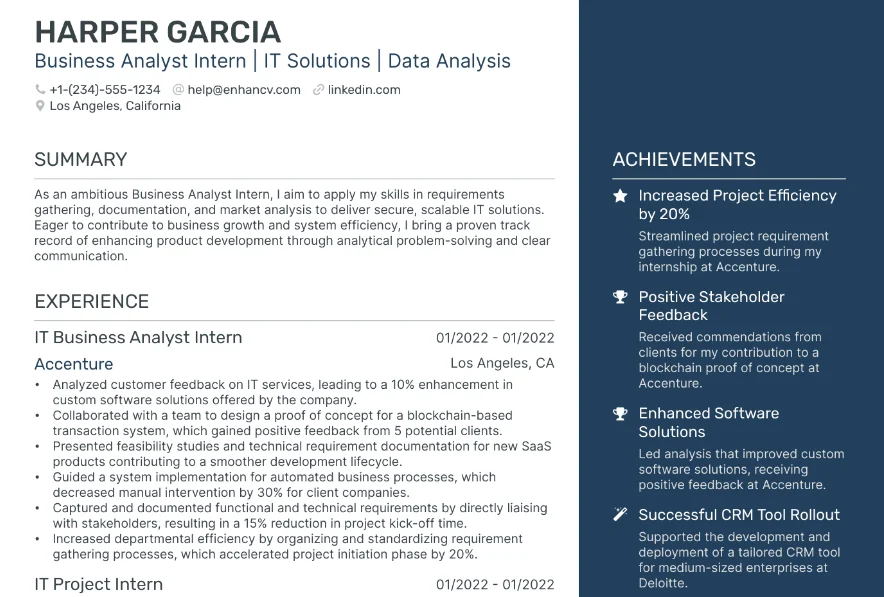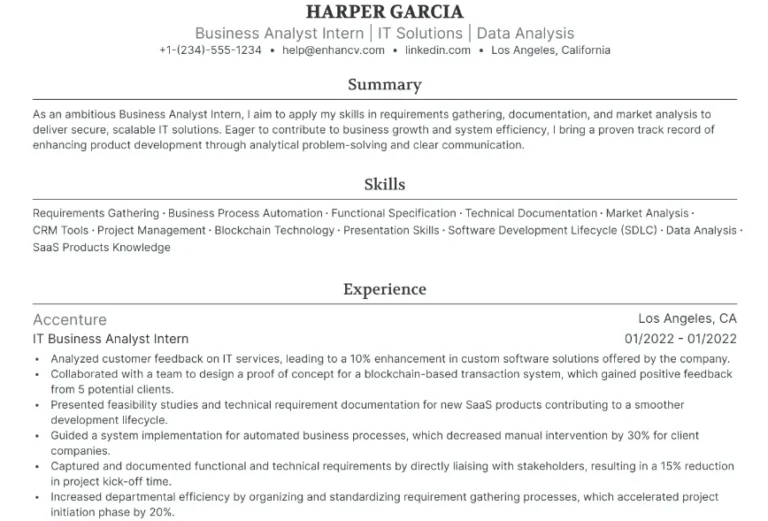Introduction
Entry Level Business Analyst Resume: Are you looking to kick-start your career as a business analyst but unsure where to begin with your resume? No worries! This guide will walk you through creating an impressive entry-level business analyst resume. Let’s make sure you stand out from the crowd!
What is a Business Analyst?
A business analyst is someone who uses data analysis to help companies improve their processes, products, services, and software. They work as a bridge between IT and the business to ensure everyone understands each other’s needs and goals.
Why is a Resume Important?
Your resume is like your first handshake with a potential employer. It’s your chance to make a great first impression and show you have the skills and qualifications needed for the job.
Understanding the Role of a Business Analyst
Responsibilities of a Business Analyst
As a business analyst, you’ll be expected to:
- Analyze business processes
- Identify areas for improvement
- Communicate findings to stakeholders
- Develop strategies for enhancing efficiency
Key Skills Needed
To be successful, you’ll need skills like:
- Analytical thinking
- Communication
- Problem-solving
- Technical knowledge
Preparing to Write Your Resume
Research Job Descriptions
Before writing, look at job descriptions for business analyst positions. This will give you a good idea of what employers are looking for.
Gather Your Information
Collect all your educational details, work experiences, skills, and other relevant information. Having everything in one place will make the writing process smoother.
Structuring Your Resume
Resume Format Types
There are a few different resume formats you can choose from:
- Chronological (lists your work history in order)
- Functional (focuses on your skills)
- Combination (a mix of both)
Choosing the Right Format
A combination format is often best for an entry-level business analyst. It allows you to highlight your skills and show your education and work experience.
Writing the Header
Name and Contact Information
At the top of your resume, include:
- Your full name
- Phone number
- Professional email address
Creating a Convincing Synopsis
What to Remember for a Synopsis
Your resume synopsis should momentarily feature what you can bring to the job. Keep it quick and painless — 2-3 sentences.
Instances of Good Synopses
“Conscientious business expert with a solid foundation in information examination and cycle improvement. Talented in conveying complex data plainly and really. Anxious to apply my scientific abilities to assist XYZ Organization with accomplishing its objectives.”
Detailing Your Education
Listing Your Degrees
Include all your degrees, starting with the most recent. For example:
- Bachelor of Science in Business Administration, XYZ University, 2023
Relevant Coursework
If you’re a recent graduate, you can also list relevant coursework for the business analyst role.
Highlighting Your Experience
Entry Level Business Analyst Resume positions and Temporary Positions
Whether or not or not you have regular work insight, temporary and seasonal positions can be significant. Show them alongside your critical obligations and accomplishments.
Instructions to Depict Your Obligations
Use activity action words and be explicit. Rather than expressing “assisted with information investigation,” say “led information examination to distinguish patterns and backing business choices.”
Displaying Your Abilities
Complex Abilities versus Delicate Abilities
Complex abilities are explicit, workable capacities similar to programming capability or information investigation. Delicate skills, identical to correspondence and cooperation, identical to correspondence and collaboration, are more about your character.

Top Skills for Business Analysts
- SQL and database management
- Data visualization tools
- Business process modeling
- Excellent communication
Adding Certifications and Training
Relevant Certifications
Certifications can make you stand out. Look for ones like:
- Certified Business Analysis Professional (CBAP)
- PMI Professional in Business Analysis (PMI-PBA)
Professional Development Courses
Include any courses you’ve taken that are relevant to the job, such as online classes on data analysis or business management.
Incorporating Keywords
Why Keywords Matter
Many companies use software to scan resumes for keywords before a human ever sees them. Including the right keywords can help ensure your resume gets noticed.
Finding the Right Keywords
Look at the job descriptions you’ve researched and pick out standard terms and phrases. Make sure these are naturally included in your resume.
Formatting Tips
Font and Size Choices
Use a clean, professional font like Arial or Times New Roman, and keep the size between 10 and 12 points.
Using Bullet Points
Bullet points make your resume easier to read. Use them to list your responsibilities and achievements under each job or education entry.
Proofreading Your Resume
Checking for Errors
Spelling and grammar mistakes can make a wrong impression. Always proofread your resume multiple times.
Tools for Proofreading
Use tools like Grammarly or ask a friend to review your resume to catch any mistakes you might have missed.
Tailoring Your Resume for Each Job
Customizing Your Resume
Don’t send the same resume to every job. Tailor it to highlight the skills and experiences that are most relevant to each position.
Examples of Tailoring
If one job emphasizes project management, ensure your resume shows your experience and skills.
FAQs
How Long Should My Resume Be?
For a section-level position, hold your resume to one page.
Would it be a good idea for me to Incorporate an Introductory Letter?
Indeed, an introductory letter permits you to explain why you’re a brilliant fit to take care of everything.
How Would I Deal with Absence of Involvement?
Feature your schooling, temporary jobs, and any critical coursework. Stress your abilities and energy to acquire.
Consider the possibility that I will have irrelevant professional training.
Centre around adaptable abilities like correspondence, cooperation, and critical thinking. Demonstrate the way that these abilities can help the job of a business investigator.
How Frequently Would it be advisable for me to Refresh My Resume?
Update your resume whenever you gain new insight or abilities. It’s likewise a decent practice to review it at regular intervals.
Summary
Making an entry-level business analyst resume could appear overwhelming, but with the correct methodology, you can create a record that addresses your capacity as a business expert. Take as much time as necessary, speak the truth about your abilities and experiences, and refine your resume to match your ideal work.
